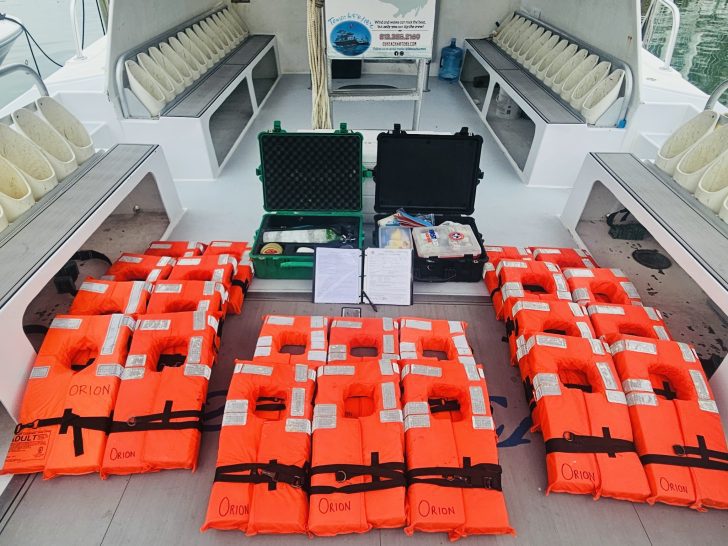It was a typical January afternoon with air temps in the 40’s and a north wind around 25 knots, way too rough to even think about running a trip. A few of our regular dive customers walked into the shop, surprised to see us getting down and dirty on one of our boats. One of them laughed, “Shouldn’t you guys be enjoying couch time or working on your short game?” At that moment, I realized they had no clue as to what goes into running a Coast Guard certified vessel. Come to think of it, I’ll bet most people don’t know what goes into holding this designation.
Let’s start with the number 7. That is the key figure that requires a boat to be inspected by the Coast Guard to take passengers for hire. It’s why you see so many boats that carry 6 or less and so few that can accommodate a party of 7 or more. I have never been given a clear explanation as to why or how that line of demarcation came to be, but the jump from 6 to 7 changes everything in the charter industry.
January and February mark the time of year most boat owners with this designation on the central Gulf Coast schedule our annual Coast Guard inspections. These inspections are vital, as they ensure our vessels are operating safe and sea-worthy. As a result, the Coast Guard inspects every nook and cranny of the boat, sometimes even sending in full crews to inspect one boat. They scour through topside, bow to stern, to make sure everything is at an operational standard until the new year. Every other year, the boat is hauled out so inspectors can do a complete check of the hull and running gear. They make sure there are no soft spots or stress cracks that a top side inspection cannot see. Depending on the size of the vessel, these inspections can last days.
Over the course of a year, the sun, salt and intense sea conditions take a toll on even the most well-maintained boats. Coupled with the Guards ever-changing points of emphasis during the inspection, boat operators are forced to pinpoint every gremlin and fix even the most minor issues. This is crucial to pass the test, as each member of the Coast Guard are well-trained and strict in their code, with the most minor of deficiencies resulting in a slap on the wrist. Or worse, they have the power to completely shut down your operation on the spot, if they deem it necessary. Thus, each and every boat operator has to remain diligent in their preparation, stressing that each and every detail is perfect.
Experience has taught me to embrace these inspections. I know that, once it’s over, the to-do list will be clear, my boats will be full of upgrades, and the super-detail will leave our girl in the best shape possible–ready to take eager clients out on the water. Nothing can beat that feeling. And, with our business going from zero to Mach 10 the last week of February, NASCAR has nothing on us.

